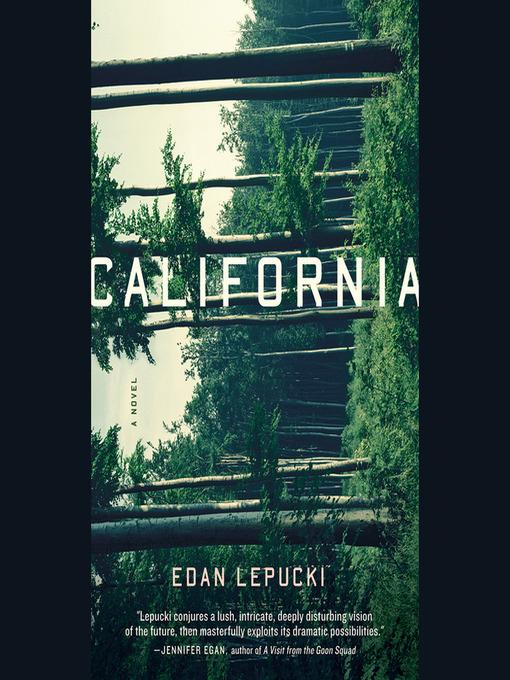
California
A Novel
کتاب های مرتبط
- اطلاعات
- نقد و بررسی
- دیدگاه کاربران
نقد و بررسی

May 5, 2014
In her suspenseful debut, Lepucki envisions a postapocalyptic America and the people left behind. After fleeing a decaying, ransacked Los Angeles to begin anew in the wilderness, married couple Cal and Frida are faced with dwindling supplies and an uncertain future. When Frida discovers she might be pregnant, the need to connect with other survivors becomes all the more imperative. The couple finds hope after stumbling upon a fortified rogue encampment in the woods with startling connections to Frida’s past. That is, until unsettling aspects about the place—the absence of any children in the community, a despotic leader, and ties to an underground group linked to a suicide bombing, among other revolutionary acts—suggest Cal and Frida might be better off on their own. Though real-world parallels can be drawn regarding the circumstances of the world’s decline and rebirth in the novel—“the Group” is like a mash-up of the Occupy Wall Street and Weather Underground movements; the sterile wealthier “Communities” clearly signify the 1%—Lepucki focuses on Cal and Frida’s evolving relationship and their divergent approaches to their predicament. As seen in chapters told from their alternating perspectives, the less they trust each other, the more tension mounts, building to an explosive climax that few readers will see coming.

July 1, 2014
The end of American civilization has come and gone, and a young married couple has fled Los Angeles to live in the wilderness in Lepucki's debut novel.Cal and Frida, alone in the woods, provide for themselves-but once Frida becomes pregnant, finding more of civilization's refugees becomes important, especially since their only neighbors have committed suicide. They find an encampment surrounded by spikes and are invited to be candidates for the group. They will stay with the community, making friends and learning the ropes, until the other commune members vote on whether they should stay or leave. Soon they discover there are dangers even in this relatively secure place. They notice there are no children in the group, so they hide Frida's pregnancy. Other unsettling details emerge as the couple tries to win the commune over-Frida by baking, Cal by serving as a member of the community counsel. The color red is forbidden. Surprisingly luxurious supplies arrive-but from where? The counsel is full of secrets, and the leader forbids Cal from sharing them with Frida. One character, thought to have died in a suicide bombing before Cal and Frida struck out for the wild, is miraculously alive at the commune, after the couple spent many pages grappling with his death. This is a misstep on Lepucki's part, showing the reader that she isn't above bending the rules, which makes it more difficult to feel real concern for Cal and Frida. They will never be in too much trouble; Lepucki won't allow it. The chapters alternate between Cal's point of view and Frida's and are heavy on flashbacks that bog down an otherwise tense narrative of survival.This has the bones of an excellent book, but, sadly, an untenable amount of flab is covering them.
COPYRIGHT(2014) Kirkus Reviews, ALL RIGHTS RESERVED.

July 1, 2014
Two years ago, Frida and Cal made their way out of Los Angeles to live in seclusion, off the land, away from the violence of terrorists such as the Group, which tore the world apart, and the Communities, which cater to only the wealthiest clientele. They have adapted to their new lives, but when Frida becomes pregnant they worry for the safety of their unborn child. Not far from their cabin is a settlement called the Land, which is purported to be unwelcoming to visitors. Despite their reservations, Frida and Cal make their way there, hoping to find assistance if not acceptance. What they discover is both surprising and unsettling. VERDICT While this debut novel has some potential as a disturbing postapocalyptic thriller, it stumbles in its execution. The characters don't evoke a lot of sympathy and the ambiguous ending leaves readers hanging. [A July LibraryReads pick; Stephen Colbert promoted the book as a response to the Amazon-Hachette dispute (ow.ly/y71R0).--Ed.]--Karin Thogersen, Huntley Area P.L., IL
Copyright 2014 Library Journal, LLC Used with permission.

June 1, 2014
The catalysts for the current wave of postapocalyptic novels are many, from financial collapse to climate change, yet the bludgeoned, class-stratified, post-tech worlds writers envision are eerily similar. Still, from this blasted landscape, imaginative stories of survival by writers such as Margaret Atwood and James Howard Kunstler flower. First-time novelist Lepucki steps gamely into this arena to tell the tale of Frida and Cal, an ardent couple who have fled decimated Los Angeles to try to live off the land. Their only human contact is with a mysterious itinerant trader until they eventually discover a family homesteading nearby and learn of a strange, labyrinthine border of towering spikes. What is this structure protecting? The perils are many, everyone is vulnerable, and there is no reliable information beyond that of the senses, emotions, and intellect. Lepucki's characters, therefore, must weigh every word, expression, and gesture. This results in too much disquisition through conversations, and the plot falters, but the settings are haunting and Lepucki's inquiry into the psychology of trust, both intimate and communal, is keen and compelling.(Reprinted with permission of Booklist, copyright 2014, American Library Association.)

























دیدگاه کاربران